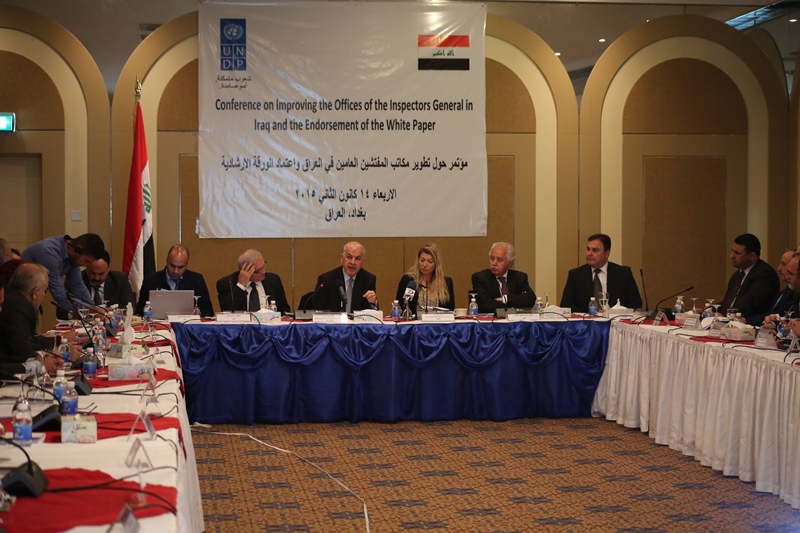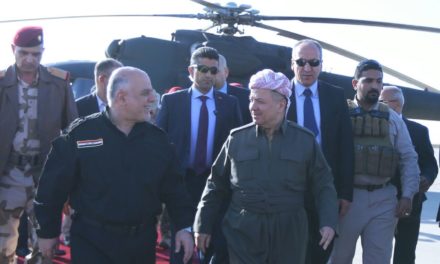(UNDP Conference on the development of IGOs. Photo: ACRLI)
There has been a sustained effort by the Iraqi parliament to abolish the Inspectors General Offices (IGOs), and it is very likely that it will happen as MPs are pushing for a second reading that makes the draft law to abolish them binding. Doing so would be a terrible idea for many reasons.
The idea of the modern day IGOs comes from the United States and is used in other countries as well. Based on order no. 57 by the Coalition Provisional Authority (CPA) in 2004, IGOs were created with the mandate of auditing ministerial performance and records, in addition to receiving complaints regarding illegal conduct and misuse of power.
Trying to phase out IGOs has been ongoing for years. These efforts started early back in 2015 but faced opposition. Members of the parliamentary legal committee re-stated the importance of IGOs in minimizing corruption and exposing abuse of power and offered their support through discussing the challenges and pressures that inspectors general face. Nevertheless, due to political pressure, a draft law made its way to the parliament through the legal committee. In November 2017, the parliament published a draft law to abolish IGOs and substitute them with Public Prosecutor’s Offices (PPOs), which are responsible for financial and administrative issues in every ministry and agency. The idea did not take off, although the conviction remained that IGOs needed reform.
Those who were aiming to phase out the post of Inspector General never gave up. In December 2018, news reports started to discuss renewed efforts to abolish IGOs. Today, it represents a significant issue between the Cabinet and the Parliament, to the level that the latter voted to terminate the IGOs in principle, in the same joint session on corruption with the cabinet and judiciary in which the prime minister vowed to work on reevaluating IGO performance and make their offices more impactful.
The reasons stated by those who propose phasing out IGOs are multifaceted. The opponents of IGOs claim that their presence causes duplicated efforts. According to them, with the judiciary, Commission of Integrity, the Board of Supreme Audit (BSA), and the Parliament itself, the IGOs are unnecessary. Furthermore, opponents of IGOs state that other than order 57 by CPA which established these offices, there is no detailed law specifying in detail their role that gives them the required authority to operate. At any rate, there is an agreement that IGOs are ineffective given the grave situation of corruption in the country.
These arguments leave out the fact that the whole system in place to combat corruption needs to be reevaluated and redesigned, including IGOs. The establishment of PPOs in each ministry and agency as the draft law to abolish IGOs states its purpose is to remove one layer and add another. Furthermore, according to the Public Prosecutors Law of 2017, the Public Prosecution Apparatus is part of the Judiciary in Iraq, unlike in the U.S. This law will limit the role of PPOs to prosecute, falling short of the remit of IGOs, which play an active role in monitoring and giving feedback, in an attempt to tackle corruption before it happens. According to former Integrity Commissioner Hassan Al-Yaseri, abolishing them will affect Iraq’s rating in corruption indices badly.
The more likely reasons why there is so much political pressure to abolish these offices is that Inspectors General have the potential to challenge both ministers and parliamentarians, especially those from the same party. As Baghdad-based political analyst, Ali Al-Mawlawi states, “oversight can be a pain in the neck if you’re an MP looking to cut shady deals with ministries.” Al-Mawlawi’s statement becomes exceptionally clear when reading the annual report published by the COI: “The parliament is the least cooperative state institution in the country when it comes to corruption. Out of 319 members, only 53, which is about 16% of all parliamentarians, have made financial disclosures, and 26 of those who did revealed a conflict of interest in their financials.”
Pro-abolishment MPs often state that these offices undermine their supervisory role and aspire to infringe on the work of the parliamentary integrity committee. Nevertheless, when looking at its annual report, the COI received only 83 corruption reports from parliament in 2018, while Inspectors General sent 384 reports, making it second after external whistleblowing on corruption.
Instead of stating the lack of laws that define the authority of IGOs to phase them out, Parliament should legislate effective laws necessary for their work. There needs to be a law that requires all ministries and government agencies to set themselves performance and corruption measures and be accountable for achieving their specified goals every year. Furthermore, IGOs need their dedicated laws that tasks these offices in addition to reporting corruption cases and abuse of power, with monitoring the performance and corruption measures mentioned earlier. One of the most import tasks for IGOs should be taking over the responsibility of pointing out stalled projects from the COI, with the latter focusing more on investigating and prosecuting corruption cases. IGOs should publish their findings quarterly online as it happens in the U.S. where a dedicated website publishes all federal Inspectors General reports in one place. These reports can be an invaluable source of information for policymakers, judiciary, and auditing bodies to further investigate the findings of IGOs and pursue corruption and mismanagement cases.
Abolishing IGOs under the pretext that they are ineffective is a grave mistake. Instead, parliament and cabinet need to create a proper environment in which IGOs can function effectively. As Omar Sattar, an Iraqi journalist said in his article on the same issue, “[t]he idea of phasing out inspectors general offices cannot be perceived as a step in the right direction unless other moves designed to resolve the problems facing the judiciary are taken in parallel.”

Muhammad Al-Waeli
Muhammad Al-Waeli is a Ph.D. candidate in management focusing on leadership and reform in Iraq.










